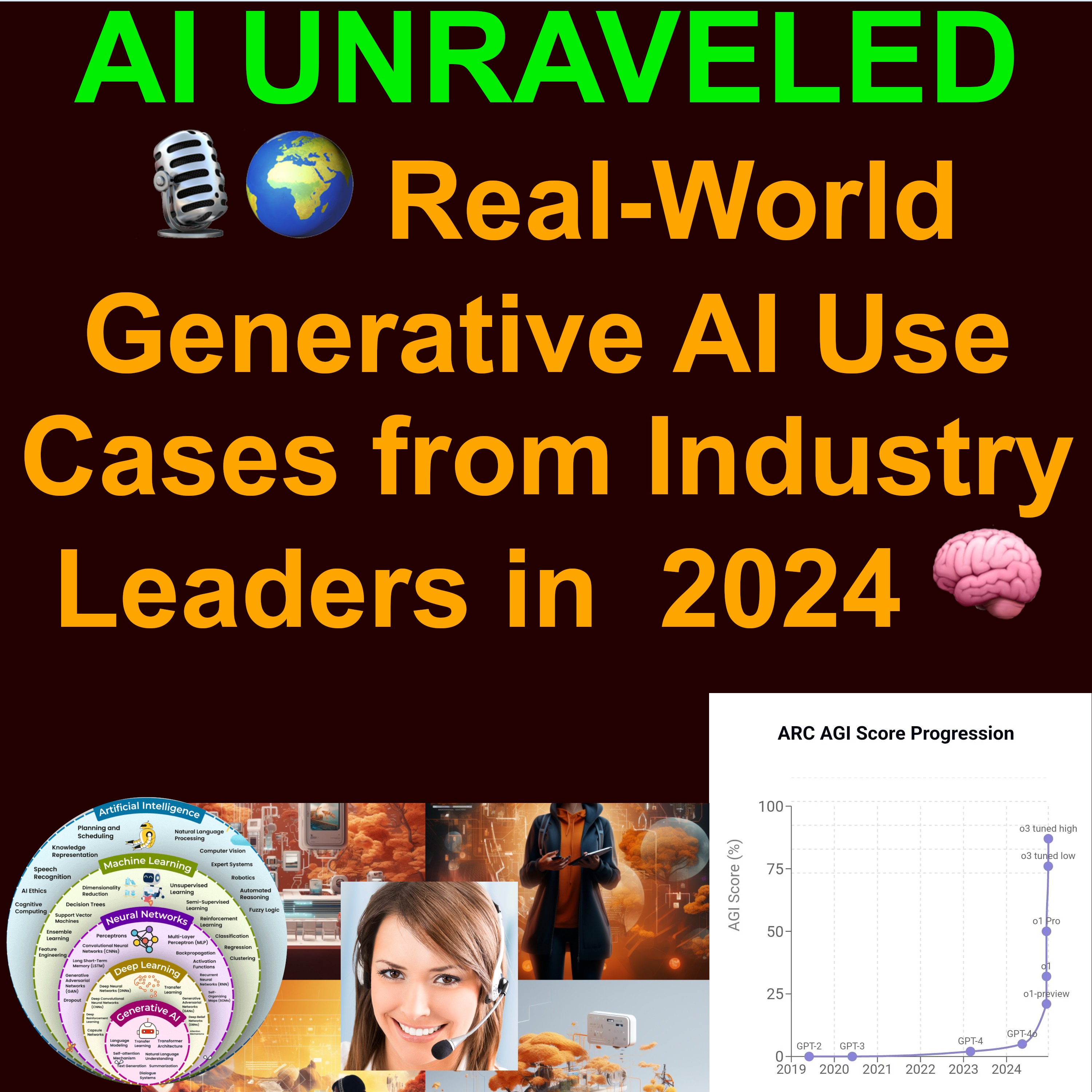
🌍 Real-World Generative AI Use Cases from Industry Leaders

AI Unraveled: Latest AI News & Trends, GPT, ChatGPT, Gemini, Generative AI, LLMs, Prompting
Deep Dive
How is generative AI being used in marketing to solve real business problems?
Generative AI is being used in marketing to tailor messages in real time based on data like demographics, foot traffic, and time of day. For example, PODS used AI in their Reynolds Smartest Billboard campaign in New York City to adjust ads to resonate with specific neighborhoods, solving the challenge of making one message appeal to diverse audiences.
What is the significance of AI chatbots like Luu in retail?
AI chatbots like Luu, used by Brazilian retail giant Magalu, go beyond answering customer queries by becoming influencers with millions of followers on platforms like TikTok. This blurs the lines between AI and personality, raising questions about the future of digital relationships and connection.
How is AI improving safety in ride-sharing apps?
AI is being used in ride-sharing apps like those developed by 704 Apps to analyze audio during rides and detect hostile language. This real-time analysis addresses safety concerns, showcasing how AI can be used to create positive impacts and mitigate risks.
What role does generative AI play in customer service at Best Buy?
Best Buy uses generative AI to power their virtual assistant, which helps customers troubleshoot product issues, reschedule deliveries, and manage Geek Squad subscriptions. This improves efficiency and saves time for both customers and the company.
How is AI transforming insurance claims processing?
LoadSure, an insurance company, uses AI to automate claims processing, making it faster and more accurate. This reduces human error and allows employees to focus on tasks requiring human judgment and empathy, optimizing the collaboration between humans and AI.
What is the impact of AI on employee productivity in companies like Cost Plus Drakes?
Employees at Cost Plus Drakes save an average of five hours per week by using AI features in Gmail. This productivity boost allows them to focus on more strategic tasks without needing advanced technical skills, democratizing expertise and enhancing efficiency.
How is AI being used to address climate change?
AI is being used to tackle climate change by managing energy grids more efficiently. For example, Southern California Edison uses AI to predict energy demand and optimize the distribution of renewable energy sources like solar and wind power, reducing reliance on fossil fuels and preventing blackouts.
What are the ethical considerations in using AI for societal challenges?
While AI has the potential to address societal challenges like financial inclusion and job matching, it must be used responsibly to avoid perpetuating inequalities. For example, Qatar's Ministry of Labor uses AI to match graduates with jobs while ensuring the technology does not reinforce existing workforce disparities.
How is AI accelerating drug discovery in healthcare?
AI is being used to create computational models of diseases, allowing researchers to test new drugs and therapies virtually. Companies like Cider Reason are leveraging this technology to speed up drug development, reducing risks and costs associated with traditional methods.
What skills are essential for thriving in an AI-driven future?
Critical thinking, creativity, problem-solving, empathy, and adaptability are essential skills for thriving in an AI-driven future. These uniquely human skills complement AI tools, enabling individuals to navigate ethical dilemmas, solve complex challenges, and build meaningful relationships.
Shownotes Transcript
**🌍 **Real-World Generative AI Use Cases from Industry Leaders)
A comprehensive showcase of 101 generative AI applications by global organizations, illustrating transformative impacts across industries like healthcare, retail, and finance.
What this means: This compilation highlights how generative AI is reshaping business operations, driving innovation, and solving complex challenges at scale. [Source)]
AI and Machine Learning For Dummies: Your Comprehensive ML & AI Learning Hub [Learn and Master AI and Machine Learning from your iPhone) ]
Discover the ultimate resource for mastering Machine Learning and Artificial Intelligence with the "AI and Machine Learning For Dummies" app.
iOs: https://apps.apple.com/ca/app/machine-learning-for-dummies/id1611593573)
PRO Version (No ADS, See All Answers, Practice Tons of AI Simulations, Plenty of AI Concept Maps, Pass AI Certifications): https://apps.apple.com/ca/app/machine-learning-for-dummies-p/id1610947211)
What you can do with this App:
- 🚀 Learn AI interactively! Tweak models, code exercises, visualize concepts, & tackle projects. Perfect for beginners to master AI/ML easily.
- 🎓 AI & ML made easy! Hands-on coding, visual tools, and real-world examples. Engage with fun, interactive learning & community support.
- 🤖 Master AI step-by-step! Practice coding, explore simulations, & see real-time changes. Fun, interactive tools simplify complex AI concepts.
- 🌟 AI learning simplified! Interactive models, coding challenges, flashcards & real-world projects. Visualize & build your own AI models.
- 💡 Explore AI with real-time simulations! Watch neural networks in action & learn by tweaking parameters. Coding & visual tools make it easy.
- 📚 Learn AI the hands-on way! Code exercises, visual tools, & interactive simulations. Fun, engaging, and perfect for all skill levels.
- 🏆 Interactive AI education! Tackle coding, visual tools, real-world projects, & fun challenges. Earn badges & climb the leaderboard.
- 🔍 See AI in action! Tweak parameters & watch real-time effects. Coding & visual tools make learning neural networks & ML concepts easy.
- 🧠 Your AI guide! Visualize, code, & build models with interactive tools. Learn at your pace & join a supportive community.
- 🎓 Hands-on AI learning! Practice coding, see concepts visually, and learn through real-world projects. Fun, engaging, and easy to follow.